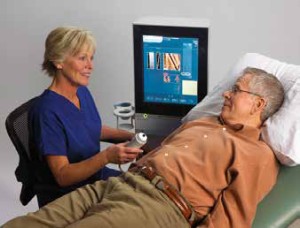- Date Published:
- Category: Blogs
Introducing the FibroScan to Enhance Patient Care at the Liver Institute
The Liver Institute at Methodist Dallas Medical Center makes a difference in the lives of patients each and every day including Graham, Texas resident Stanley “Stan” Ten years ago, Stan received his new liver at Methodist Dallas, which has allowed him more time with his wife, children and grandchildren. Thankful for the gift of life, additional time and compassionate care he received, Stan has provided ongoing support for The Liver Institute, first through the establishment of the Stanley Fund and most recently through a gift that supported the purchase of a FibroScan device, a new tool used in the diagnosis and management of liver disease.
“I just could not have asked for anything better than the care I received from the physicians and staff at Methodist Dallas,” said Stan. “Being able to provide support through the drug assistance fund and now the purchase of the new FibroScan are ways that I’m able to give back.” FibroScan is technology that has been used in other countries for a number of years to evaluate the extent of liver damage in patients with chronic liver disease. The FDA recently approved its use in the United States, and The Liver Institute is the first and only hospital in Dallas providing the noninvasive testing to measure the degree of liver fibrosis (scarring), or stiffness, in the liver without the need for biopsy. In addition to being noninvasive, the benefits to patients include faster, easier and less expensive liver disease evaluation, as well as the potential for more frequent monitoring of improvement or progression of liver fibrosis.
 Fibroscanning technology uses high-frequency vibration sound waves to measure the stiffness of the liver. Before FibroScan, a patient receiving an abnormal liver function test, a positive test for viral hepatitis — including hepatitis C and hepatitis B — or an autoimmune liver disease diagnosis would require a liver biopsy to measure the extent of established liver fibrosis.
Fibroscanning technology uses high-frequency vibration sound waves to measure the stiffness of the liver. Before FibroScan, a patient receiving an abnormal liver function test, a positive test for viral hepatitis — including hepatitis C and hepatitis B — or an autoimmune liver disease diagnosis would require a liver biopsy to measure the extent of established liver fibrosis.
Stan recalled having his liver biopsied leading up to his transplant. “I would have welcomed this scanning procedure that would have allowed closer monitoring of my liver disease advancement. When I learned of the technology, I knew it was important for The Liver Institute to be able to offer patients this new monitoring procedure.”
INNOVATIVE TREATMENTS CONTINUE TO ADVANCE PATIENT CARE
FibroScan uses a wand-like probe placed atop the skin close to the liver. A painless vibration sent through the liver measures the speed of the sound wave as it travels through the liver. The faster the vibration travels through the liver the “stiffer” the liver, indicating more scar tissue and advanced disease.
FibroScan is painless; patients report it feels similar to an abdominal ultrasound. The procedure takes just 10 to 15 minutes. Results are immediate, allowing the physician to discuss the results with the patient during the visit. Patients are able to return to normal activities following the procedure. Invasive tests with sedation, like a liver biopsy, have limitations that can impact the patient’s return to daily activities or work.
The new FDA-approved FibroScan technology enhances evaluation and management of patients with chronic liver diseases like viral hepatitis C, hepatitis B, autoimmune liver disease and fatty liver disease. It is helpful in assessing patients with abnormal liver function who are at risk of advanced fibrosis, allowing timely intervention before the development of cirrhosis.

“Europe has been using the FibroScan for several years to monitor chronic liver diseases,” said Abdullah Mubarak, MD, hepatologist practicing at The Liver Institute at Methodist Dallas. “A biopsy was considered the most accurate procedure and gold standard in evaluating fibrosis of the liver. FibroScan is complementary in liver fibrosis assessment with other blood tests and liver imaging (ultrasound, CT scan or MRI). The FibroScan procedure can be used to track disease progression or regression over time to monitor whether a patient’s liver disease is getting better, getting worse or stabilizing with treatment.”
Today, new drug therapies are curing more patients with hepatitis C, a silent disease that destroys the liver. Before the FibroScan, liver biopsies were the most accurate option to evaluate liver disease progression. While biopsies are the best tool in some cases, the noninvasive scanning procedure allows physicians the ability to immediately measure the elasticity of the liver.
“In many clinical trials, FibroScan measurement of liver fibrosis is accepted in lieu of a liver biopsy prior to enrollment of patients,” said Dr. Mubarak. “We are excited to have FibroScan as a new innovative diagnostic technology that helps our overall goal of closer monitoring of our patients with liver disease and improvement of patient outcomes.”
Thanks to the generosity of Stan, the physicians at The Liver Institute are able to continue to provide innovative care with new technologies like the FibroScan. The Liver Institute is one of only two hospitals in Texas offering the innovative diagnostic testing.


